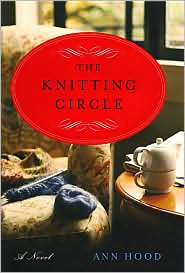 The story of a mother trying desperately to recover from the untimely death of her child, The Knitting Circle is by turns heartwrenching and heartwarming.
The story of a mother trying desperately to recover from the untimely death of her child, The Knitting Circle is by turns heartwrenching and heartwarming.Once upon a time I read a story called "The Parable of Kisagotami" which is a part of a series of Buddhist parables. The parable reads:"
The Story of Kisagotami
Kisagotami became in the family way, and when the ten months were completed, gave birth to a son. When the boy was able to walk by himself, he died. The young girl, in her love for it, carried the dead child clasped to her bosom, and went about from house to house asking if my one would give her some medicine for it. When the neighbours saw this, they said, “Is the young girl mad that she carries about on her breast the dead body of her son!” But a wise man thinking to himself, “Alas! this Kisagotami does not understand the law of death, I must comfort her,” said to her, “My good girl, I cannot myself give medicine for it, but I know of a doctor who can attend to it.” The young girl said, “If so, tell me who it is.” The wise man continued, “Gautama can give medicine, you must go to him.”
Kisagotami went to Gautama, and doing homage to him, said, “Lord and master, do you know any medicine that will be good for my boy?” Gautama replied, “I know of some.” She asked, “What medicine do you require?” He said, “I want a handful of mustard seed.” The girl promised to procure it for him, but Gautama, continued, “I require some mustard seed taken from a house where no son, husband, parent, or slave has died.” The girl said, “Very good,” and went to ask for some at the different houses, carrying the dead body of her son astride on her hip. The people said, “Here is some mustard seed, take it.” Then she asked, “In my friend’s home has there died a son, a husband, a parent, or a slave?” They replied, “Lady, what is this that you say! The living are few, but the dead are many.” Then she went to other houses, but one said, “I have lost a son”; another, “I have lost my parents”; another, “I have lost my slave.” At last, not being able to find a single house where no one had died, from which to procure the mustard seed, she began to think, “This is a heavy task that I am engaged in. I am not the only one whose son is dead".Anne Hood's story is exactly this - a woman recognizing that everyone has some kind of grief, and everyone has lost someone they love.
This one needs a box of Kleenex in addition to the tea...some people may not like it because it's not really a 'feel good' book. It's more like "Everyone has their miseries, only they hide it very well. They reveal their grief and the heroine feels better".
No comments:
Post a Comment